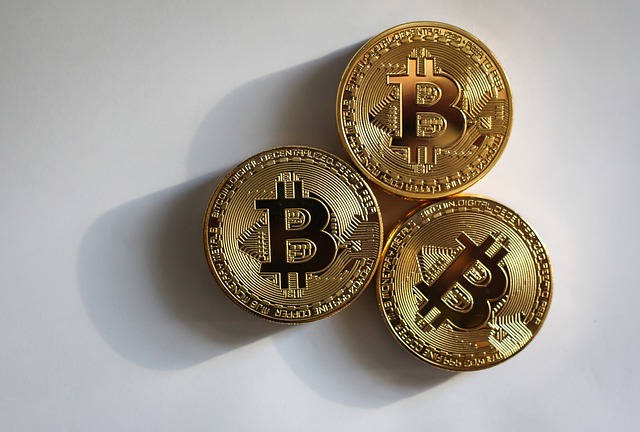Decentralized Finance Benefits: A Blueprint for Financial Liberation
Decentralized Finance Benefits: A Blueprint for Financial Liberation

The Basics of Decentralized Finance
Decentralized finance, also known as DeFi, is an emerging concept that has been gaining momentum in recent years.

One of the key features of DeFi is the use of smart contracts, which are self-executing agreements that automatically execute transactions when certain predefined conditions are met. This eliminates the need for middlemen, such as banks or brokers, to facilitate transactions and ensures that the process is more transparent and efficient. Additionally, the use of blockchain technology provides enhanced security, as all transactions are recorded on a public ledger that is immutable and resistant to tampering.
In summary, the basics of decentralized finance lie in its ability to harness the power of blockchain technology to create a more inclusive and transparent financial system. By eliminating middlemen and intermediaries, it empowers individuals to have greater control over their finances and opens up access to financial services for those who have previously been excluded. Moreover, the use of smart contracts and blockchain ensures that transactions are more secure, efficient, and transparent.
The Evolution of Traditional Financial Systems
In the past century, traditional financial systems have undergone a significant transformation. With the advent of technology and globalization, the way we handle money and conduct financial transactions has changed drastically. The evolution of traditional financial systems can be traced back to the introduction of electronic banking in the 1960s. This innovation allowed individuals and businesses to access their accounts and perform transactions remotely, liberating them from the constraints of physical branches and restricted business hours.
Furthermore, the rise of credit cards in the 1970s brought about a paradigm shift in consumer spending. People could now conveniently make purchases without carrying cash, leading to increased consumerism and a significant boost to the economy. As the world moved into the digital era, online banking emerged in the 1990s, revolutionizing the way people manage their finances. Online banking offered convenience, real-time access to financial information, and the ability to perform transactions from the comfort of one’s home.
Overall, the evolution of traditional financial systems has been marked by a continuous push for efficiency and convenience. With each technological advancement, the barriers to accessing financial services have decreased, making it easier for individuals and businesses to participate in the global economy. This evolution has paved the way for the emergence of decentralized finance, which promises even greater empowerment and financial liberation for individuals.
The Concept of Financial Liberation
Imagine a world where financial power is no longer concentrated in the hands of a privileged few, but instead, accessible to every individual. This is the concept of financial liberation, a revolutionary idea that seeks to break free from the confines of traditional financial systems. Decentralized finance, or DeFi, is at the forefront of this movement, offering empowering solutions that challenge the status quo.
Gone are the days when banks and other intermediaries held the keys to our financial freedom. With DeFi, individuals can take control of their own financial destiny, bypassing the need for middlemen. By leveraging blockchain technology, decentralized finance allows for direct peer-to-peer transactions, eliminating the need for cumbersome intermediaries. This not only reduces the bureaucracy and delays typically associated with traditional financial systems but also removes the fees and barriers that often prevent individuals from accessing essential financial services. In short, financial liberation through decentralized finance is all about empowering individuals to take charge of their financial lives, paving the way for a more inclusive and accessible financial future.
How Decentralized Finance Empowers Individuals
Decentralized finance, or DeFi for short, has emerged as a powerful tool that empowers individuals in managing their finances. With traditional financial systems, individuals often find themselves limited by various barriers and restrictions. However, DeFi breaks down these barriers, giving individuals the freedom to take control of their financial future.
One way DeFi empowers individuals is by providing access to financial services that were previously out of reach. Traditional banking systems often exclude certain populations, such as the unbanked or underbanked, due to stringent requirements and high fees. In contrast, DeFi allows anyone with an internet connection to access financial services without the need for a middleman or intermediary. This means that individuals who were previously excluded can now participate in activities like lending, borrowing, and investing, leveling the playing field and promoting financial inclusion.
Moreover, DeFi offers individuals the opportunity to reduce costs and fees associated with traditional financial systems. In traditional banking, individuals are often subject to high transaction fees, account maintenance fees, and other hidden charges. With DeFi, transactions are conducted directly on the blockchain, eliminating the need for intermediaries and reducing costs. This not only saves individuals money but also enables them to make the most of their hard-earned earnings.
In conclusion, decentralized finance is revolutionizing the way individuals interact with their finances. By providing access to financial services, reducing costs, and eliminating middlemen, DeFi empowers individuals to take control of their financial destiny. With the potential for higher returns on investments and the use of blockchain technology, the future of DeFi looks promising.
Transparency and Security in Decentralized Finance
Decentralized finance (DeFi) has emerged as a groundbreaking financial system that promotes transparency and security in a whole new way. Unlike traditional financial systems that rely heavily on centralized authorities, DeFi utilizes blockchain technology to ensure trust and accountability. This means that every transaction or action taken within the DeFi ecosystem is recorded on the blockchain, making it transparent and visible to all participants.
The transparency in DeFi brings numerous advantages.

The Elimination of Middlemen and Intermediaries
Decentralized finance has brought about a revolutionary concept in the world of traditional financial systems – the elimination of middlemen and intermediaries. In the traditional financial system, there are several parties involved in every transaction, such as banks, brokers, and clearinghouses. Each of these intermediaries plays a role in facilitating the transaction but also adds complexity and costs to the process.
However, with decentralized finance, the need for these intermediaries is greatly reduced, if not completely eliminated. This is made possible through the use of smart contracts, which are self-executing agreements that automatically process transactions when certain conditions are met. By leveraging blockchain technology, decentralized finance enables individuals to transact directly with each other, cutting out the middlemen that typically add friction and fees to financial transactions. This not only streamlines the process but also makes it more efficient and cost-effective for all parties involved.
• Decentralized finance eliminates the need for middlemen and intermediaries in financial transactions.
• Traditional financial systems involve multiple parties such as banks, brokers, and clearinghouses.
• These intermediaries add complexity and costs to the transaction process.
• Smart contracts in decentralized finance automatically execute transactions when conditions are met.
• Blockchain technology enables individuals to transact directly with each other, cutting out middlemen.
• This streamlines the process and makes it more efficient and cost-effective.
Access to Financial Services for the Unbanked
In traditional financial systems, the unbanked population faces significant hurdles when it comes to accessing financial services. These individuals, who do not have a bank account or are not formally connected to the banking system, are often excluded from basic financial activities such as savings, loans, and investments. This exclusion can perpetuate a cycle of poverty, limiting opportunities for economic growth and stability. However, decentralized finance (DeFi) has the potential to change this situation by providing access to financial services for the unbanked.
DeFi operates on blockchain technology, which allows for peer-to-peer transactions without the need for intermediaries. This means that individuals can directly connect with others within the ecosystem to access financial services. For the unbanked, this can be a game-changer as it bypasses the traditional barriers set by banks and financial institutions. By utilizing DeFi platforms and protocols, the unbanked can now have access to a range of financial services, such as lending, borrowing, and even earning interest on their assets. This not only empowers individuals but also opens up avenues for economic inclusion and financial growth.
Reduced Costs and Fees in Decentralized Finance
One of the key advantages of decentralized finance is the significant reduction in costs and fees compared to traditional financial systems. In traditional systems, there are numerous intermediaries involved in transactions, such as banks, clearinghouses, and brokers, which often charge hefty fees for their services. These fees can add up quickly and eat into the returns of investors and the savings of individuals.
However, with decentralized finance, the need for intermediaries is eliminated or significantly reduced. Instead, transactions are conducted directly between parties using smart contracts on the blockchain. This removes the need for expensive intermediaries and their associated fees, resulting in a more cost-effective financial system. Users can enjoy lower transaction fees, reduced lending rates, and even eliminate the need for account maintenance fees. As a result, individuals have more control over their financial transactions, and the savings they accumulate can be put to better use, whether it’s for investments, savings, or everyday expenses.
The Potential for Higher Returns on Investments
Investing has long been considered a viable way to grow one’s wealth, but traditional financial systems often limit the potential returns individuals can achieve. However, with the emergence of decentralized finance, the possibilities for higher returns on investments have expanded.
In the realm of decentralized finance, individuals have access to a wide range of investment opportunities that were once predominantly available to institutional investors. The use of blockchain technology allows for greater transparency and trust, ensuring that investments are conducted in a secure and efficient manner. Moreover, the elimination of intermediaries and middlemen means that fees and costs associated with investment transactions are significantly reduced, enabling investors to retain a larger portion of their returns.
As a result, individuals who engage in decentralized finance can potentially benefit from higher yields on their investments compared to traditional financial systems. The ability to explore various decentralized platforms, such as lending and borrowing protocols or decentralized exchanges, presents individuals with diverse investment options. Additionally, the automated smart contracts inherent in decentralized finance ensure that investment processes are executed seamlessly without the need for intermediaries, further minimizing potential risks and maximizing potential returns.
Without the constraints of traditional financial systems, decentralized finance allows individuals to harness the full potential of their investments and seize opportunities for greater returns. From the democratization of investment opportunities to the reduction of fees, decentralized finance opens up a new world of possibilities for individuals seeking to grow their wealth and achieve financial success.
The Role of Blockchain Technology in Decentralized Finance
Blockchain technology is the underlying foundation that powers decentralized finance (DeFi). It provides a secure and transparent platform for financial transactions without the need for intermediaries. In traditional financial systems, transactions are typically processed by banks or other centralized institutions, leading to delays, high fees, and limited accessibility. However, with the advent of blockchain technology, DeFi platforms enable peer-to-peer transactions, ensuring faster processing times and reduced costs.
By utilizing blockchain technology, DeFi platforms are able to achieve a high level of security and transparency. Every transaction and piece of data is recorded on a decentralized ledger, which is accessible to all participants in the network. This eliminates the risk of fraud or tampering, as the data cannot be altered without the consensus of the majority of network participants. Furthermore, the transparency of the blockchain allows individuals to verify the details of each transaction, ensuring trust and accountability within the DeFi ecosystem. Overall, blockchain technology plays a vital role in enabling the trust, efficiency, and accessibility that is central to decentralized finance.
What is decentralized finance?
Decentralized finance, also known as DeFi, refers to a system of financial applications and services that operate on a blockchain, without the need for intermediaries like banks or financial institutions.
How does decentralized finance empower individuals?
Decentralized finance gives individuals more control over their financial activities, allowing them to manage their own funds, make investments, and access financial services without relying on traditional institutions.
What are the benefits of decentralized finance?
Decentralized finance offers benefits such as transparency and security, the elimination of middlemen and intermediaries, access to financial services for the unbanked, reduced costs and fees, and the potential for higher returns on investments.
How does decentralized finance ensure transparency and security?
Blockchain technology, the underlying technology behind decentralized finance, ensures transparency by making all transactions publicly visible. Additionally, the decentralized nature of the system makes it more secure against hacks or fraudulent activities.
How does decentralized finance eliminate middlemen and intermediaries?
By utilizing blockchain technology, decentralized finance allows users to directly transact with each other, removing the need for intermediaries like banks or brokers. This can reduce costs and streamline the financial process.
How does decentralized finance provide access to financial services for the unbanked?
Decentralized finance operates on a global scale, allowing anyone with an internet connection to participate. This opens up financial services to individuals who are currently unbanked or underbanked, providing them with opportunities they may not have had before.
How does decentralized finance reduce costs and fees?
By removing intermediaries and operating on decentralized networks, decentralized finance can significantly reduce costs associated with traditional financial systems. This means lower transaction fees, minimal account maintenance fees, and overall cost savings for users.
What is the potential for higher returns on investments in decentralized finance?
Decentralized finance offers a wide range of investment opportunities that were previously unavailable or restricted. With the elimination of intermediaries and the ability to access global markets, there is potential for higher returns on investments.
What role does blockchain technology play in decentralized finance?
Blockchain technology forms the foundation of decentralized finance.

Todays Featured Product:
Buy, exchange and grow your crypto securely with a Ledger hardware wallet, combined with the Ledger Live app. It’s never been easier to keep your crypto safe and accessible. Buy direct from Ledger.com and get todays Special Offers Here.




